



Schools of Sanctuary is an initiative to celebrate the good practice of schools that welcome asylum seeking and refugee families into their school community and foster a culture of welcome and inclusion for all. Schools of Sanctuary offers a way to engage sanctuary seekers and families with their local communities and educate children and teachers about the human right to sanctuary. The aim is to create a safe environment that includes everybody in a school, regardless of people’s background, ethnicity, faith or gender, as stated in the Equality Act 2010. Our journey towards becoming a School of Sanctuary was underpinned by our school ethos and values as a UNICEF Rights Respecting School, and our work to ensure ensure our children receive their rights set out in the United Nations Convention on the Rights of the Child, specifically Article 22 on refugee children.
A School of Sanctuary is a school committed to be a safe and welcoming space for all. It is a school demonstrating a whole-school approach to support and understand those who may be seeking sanctuary. A School of Sanctuary is a school helping its students, staff and wider community understand what it means to be seeking sanctuary and to extend a welcome to everyone as equal, valued members of the school community. It is a school that is proud to be a place of safety and inclusion for all.
Schools that demonstrate this attitude of welcome and inclusion can apply for an award from the City of Sanctuary movement. Evidence is collected through the three processes of Learn, Embed and Share. At Lighthorne Heath Primary School, we support the ‘City of Sanctuary’ vision that the UK will be a welcoming place of safety for all and proud to offer sanctuary to people fleeing violence and persecution.
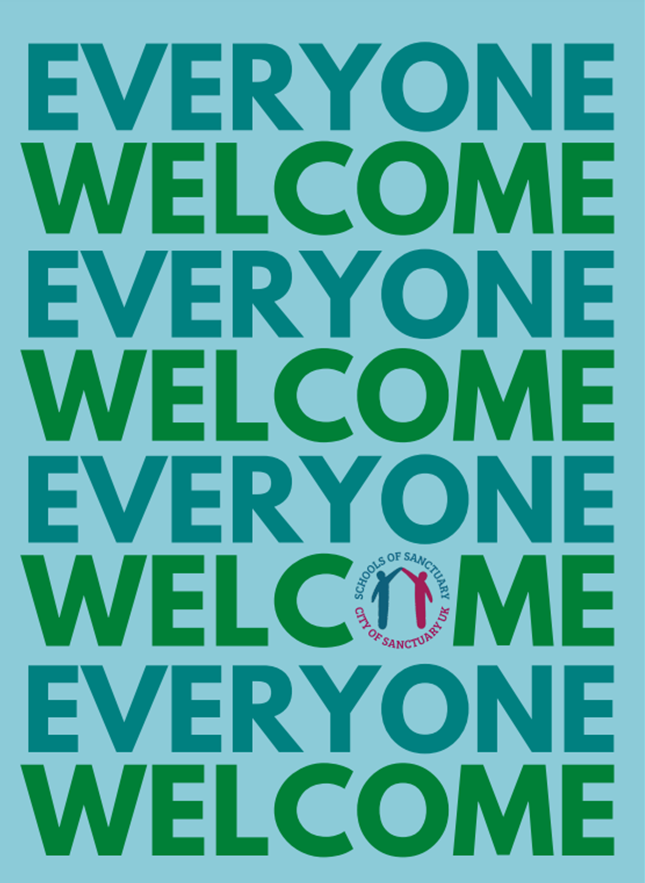
We endorse the City of Sanctuary Charter, and agree to act in accordance with City of Sanctuary values and apply the network principles within our work (as far as our specific context enables us to). We recognise the contribution of people seeking sanctuary. Sanctuary seekers are welcomed, included and supported within our context. We expect our branches or local groups (if any) to support their local City of Sanctuary group if one exists, and will facilitate contact between them and their local City of Sanctuary group.
Annually, our school participates in activities to raise awareness during Refugee Week. This year's theme was 'Our Home', and our school community worked in partnership with the Warwickshire Migration Team; Warwickshire EMTAS (Ethnic Minority and Traveller Service); Warwickshire Library Service; Warwickshire Community Partnerships team; UNICEF and the Royal Shakespeare Company on a number of exciting projects. We used the 'Simple Acts' framework to support the children's learning:
- Children developed their understanding of the experiences of displaced people by listening to the first-hand experiences of refugees in assemblies and workshops.
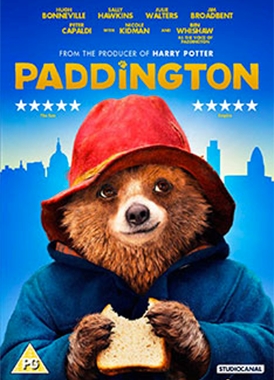
- Children looked at the story of Paddington Bear and watched the film. Although Paddington's story might be a funny and adorable tale of a famous marmalade-eating bear, Paddington is often referred to as a 'refugee' because he was displaced because of a natural disaster (an earthquake) which destroyed his family’s livelihood (producing marmalade). The children learnt that many of the problems Paddington faces in the film centre on assimilation into a new society that he recently become a part of. The sequel to the first film again sees Paddington facing a number of issues relating to his status as an illegal immigrant, in a city that is not always welcoming to him.

- UNICEF and Paddington have teamed up tocreate bespoke advent calendars - each window reveals a daily surprise gift that protects children, including refugee children, around the world, including blankets, school supplies and vaccines. Our pupil UNICEF Ambassadors are leading a fund-raising project to support refugee children around the world by organising a 'Wear it Blue Day' on World Children's Day. The funds raised will be used to purchase a Paddington Advent Calendars for each class.
- During Forest School outdoor learning, pupils imagined they were refugees and built shelters using resources they had to hand. It helped the children to think about being more resourceful and helped them to empathise with refugees and try to understand what it is like to be a refugee.

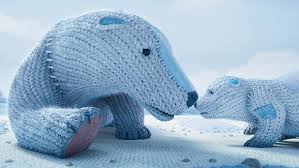
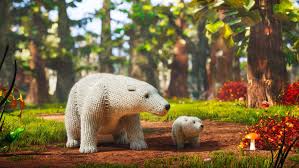
- Children watched a film called 'Migrants' as part of the 'Into Film' collection for Refugee Week. The poignant film (without any dialogue) is about two polar bears - a parent and a child - who are forced to flee their Arctic home dueto the melting ice caused by climate change. Their journey to find a new place to live sees them discover a forest comunity of brown bears. However, they don't get the welcome they expect and find it difficult to survive in their hostile new surroundings. This animated short film doesn't shy away from reflecting the harsh reality of many refugees' and migrants' stories, depicting how they are regularly persecuted by wider society.
- Some of our children and families who have experienced forced migration worked with a community artist, Jenny Davis, to collaboratively create a textiles work of art, which was proudly displayed in Leamington Library during Refugee Week.
- All of the children made books on the Refugee Week theme of 'Home', which were displayed in exhibitions in Warwickshire libraries during Refugee Week.
- School purchased a collection of picture books on the theme of forced migration and displacement recommended by BookTrust. Children discovered these stories during whole class guided reading sessions and as part of our daily read-aloud programme, which deepened their understanding of the experiences of refugees.
- Using the Refugee Week Simple Acts framework, children learnt about taking small actions to care for our shared home (including our schools; the local community; and our planet). The children learnt that ‘together we can sow the seeds of change’, and that caring for our global home isn’t just about protecting the environment, but also about nurturing our interconnected communities and seeking to achieve a sustainable future for everyone. Our children and families were encouraged to spend time in nature and re-connect with the earth. Some groups of children participated in Forest School sessions on our school site, and others took part in Forest School activities at our local art gallery, Compton Verney. A Junior Leadership Team of Eco Representatives was established. They formed an Eco Committee with various members of staff, and formed an action plan, reflecting on the Global Goals. The children reflected on ways in which they could care of our school environments and established a group of ‘Womblers’, who pick up litter at break times. They designed a logo and badge; ordered litter-picking resources; and led an assembly about their work during Refugee Week.
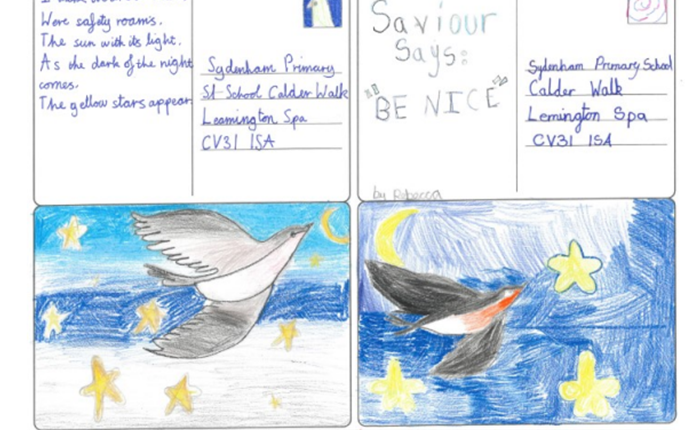
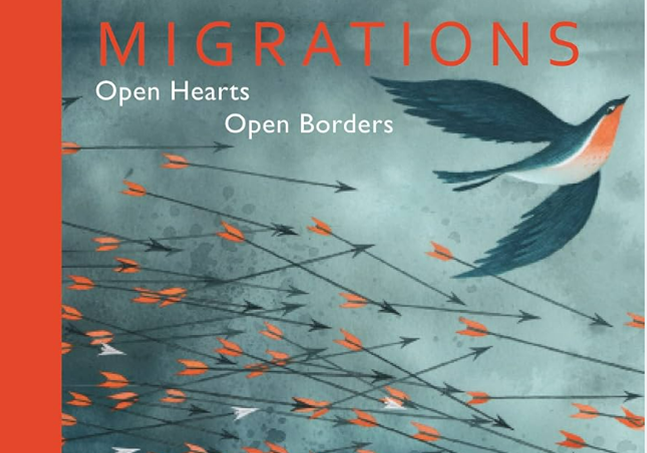
- Children made postcards, inspired by the 'Migrations: Open Hearts, Open Borders' collection designand written by picture book illustrators. The postcards display messages of hope about human migration, showing how cultures, ideas and aspirations flow, despite borders, barriers and bans.